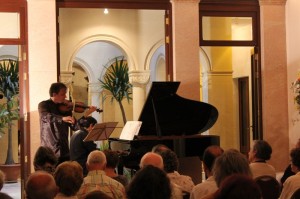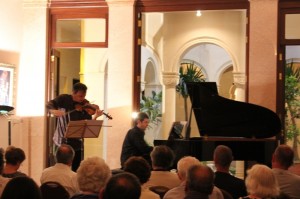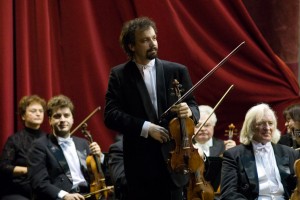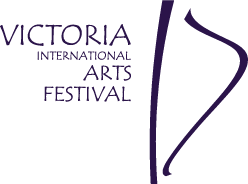Virtuoso playing at the highest level
Friday evening saw the return of violin virtuoso Dejan Bogdanovich accompanied by Gabriele Vianello on the piano in a concert of scintillating works that left the audience mesmerised with the technical prowess and interpretative ability of both performers. Duo Dejan and Gabriele is one of only 4 concerts out of 33 in this year’s edition which sees the return of the same performers from previous editions. It is the raison d’être of the VIAF organisers to present new performers each year. It is also an honour to host world-class musicians over a number of editions – such is the respect earned by the Festival and its organisers that performers such as the Martinů, Tchaikovsky award winner Daniel Veis, violinist Dejan Bogdanovich and others ask to be invited again and, not only that, but they also bring with them new performers.
This is the third time that duo Dejan and Gabriele have performed in our Festival. Friday’s concert consisted of formidable works in the violin repertoire. It started off with Tartini’s literally devilish Sonata in G Minor, better known as ‘Trillo del diavolo’. This work was executed with finesse and complete mastery over the technical difficulties for which this work is notorious. Dejan sailed through the work with ease, composure and confidence. The exquisite runs, articulated double stops, frenetic speed and consummate skill never faltered for a second and it was with an effort that the audience kept to its seat at the end, such was the excitement he managed to generate and infuse the listeners with.
Next came one of Prokofiev’s most difficult and brooding works, namely, his Sonata op.78 no.1. In breathing new life into the symphony, sonata, and concerto, Sergey Prokofiev emerged as one of the truly original musical voices of the twentieth century. Bridging the worlds of pre-revolutionary Russia and the Stalinist Soviet Union, Prokofiev enjoyed a successful worldwide career as composer and pianist. As in the case of most other Soviet-era composers, his creative life and his music came to suffer under the duress of official Party strictures. Still, despite the detrimental personal and professional effects of such outside influences, Prokofiev continued until the end of his career to produce music marked by a singular skill, inventiveness, and élan.
Cast in four movements of approximately equal length and lasting about a half-hour, this tormented Sonata for violin and piano must rank with Prokofiev’s finest works in any genre. The Andante opening panel began with an ominous theme in the bass on the piano, the death-rattle sounds of the violin soon entering overtop it. The mood remained tense as the violin struggled to steal centre stage from the piano, finally doing so with a theme that cried out painfully. Eventually the music turned ethereal when the piano gently played the opening theme in the upper register, while the violin delivered eerie, gossamer runs that slithered about hauntingly. The movement ended softly but chillingly. A hard-driving Allegro brusco followed, its main theme slashing and harsh as the piano and violin exchange angry dissonances and crushing chords. Momentarily, an alternate theme imparted a sense of nobility and hope, but could not here or later dispel the sense of fear and frenzy brought on by the dominant main material. The third movement, an Andante, opened with an ethereal, dreamy theme floating amid a sense of fantasy. An alternate theme, largely built on three notes that repeated themselves obsessively, imparted a feeling of desolation, and the whole movement gradually turned darker, sounding bleak and fearful at the end. The finale, marked Allegrissimo – Andante assai, opened with a bustling theme that seemed cheerful and almost playful, but its brightness soon appeared threatened by dark undercurrents and, as tension accrued from stomping bass chords from the piano, it collapsed. The ending of the first movement was recalled, and the music then turned bleaker and, finally, despairing. This exceedingly profound work yielded immeasurable rewards for the audience, who was left spellbound by the sheer massive intellectual quality of the work, fully grasped by both performers who manifested impeccable workmanship and affinity.
After the dark and menacing Prokofiev came Kreisler’s ‘Caprice Viennois’, a caprice in the real sense of the word, shifting musical perspective at a moment’s notice to afford violinists the opportunity to indulge in some new trick – such as the false harmonics and the strangely aristocratic downward glissando of the opening quasi-cadenza passage, or to invite the listeners to join in enjoying a warm melody (the B major of the andante con moto melody in parallel thirds is warmth itself), all the while bursting forward and holding back, rhapsodically and mock-improvisationally (or, with the liberties that Kreisler himself invariably took with his music, truly improvisationally), with that amazing rhythmic elasticity that Kreisler alone was really able to bring to his music. A middle section, marked brillante and complete with ricochet bowing and rapid repeated notes, brings some fire to the table, but just enough to light the way back to the engaging andante con moto. Two elfin pizzicato chords are tacked onto a much-abbreviated reprise of the opening to draw a delightfully unsentimental conclusion in the same B minor that began the affair. Dejan performed this work with grace, elegance and refinement, rising with nonchalance and ease from the depths of the previous work to float on the shimmering surface of the Caprice’s artifice.
The recital came to a fitting close with one of Tchaikovsky’s more charming works, his ‘Waltz-Scherzo’ op.34. This dazzlingly-colourful piece features much attractive writing for the violin, appealing, if not particularly memorable tunes, and scoring that showcases the composer’s deft orchestration skills. While it lacks the more distinctive character of Tchaikovsky’s other short work for violin and orchestra, the Sérénade mélancolique, op.26 (1875), the vibrant, joyous Waltz – Scherzo must be judged one of the composer’s more delightful works.
This was yet another high-powered concert which, together with the previous evening’s epic one, firmly established the Festival’s reputation as one that reaches towering standards in its unyielding search for quality, substance and enjoyment.







